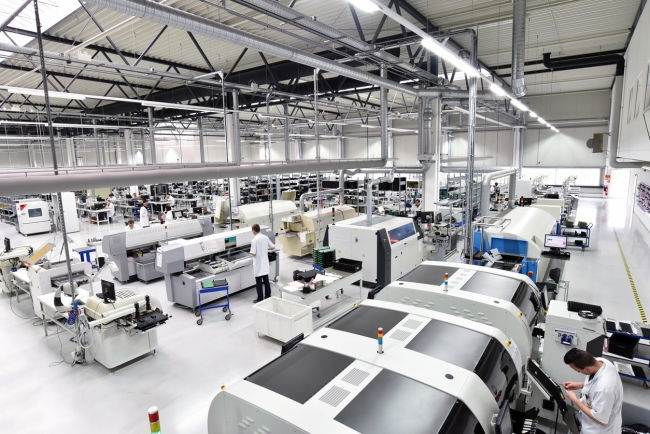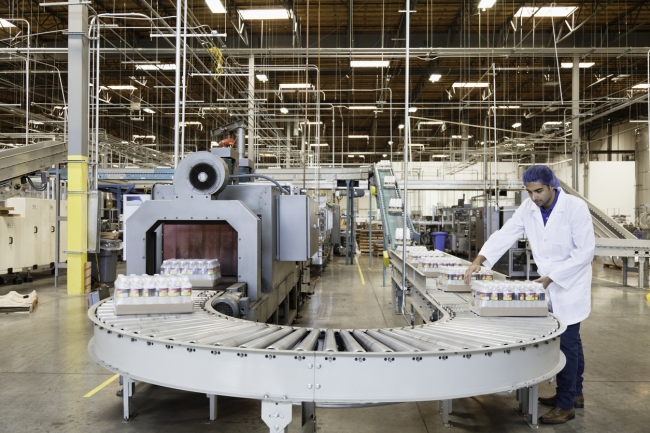5 minute read • published in partnership with PTC
Opinion: Tough decisions and firm action on digital transformation needed to navigate the challenges ahead
With a mixed outlook for UK manufacturing, tough decisions and firm action on digital transformation will be needed to navigate the challenges ahead. Nick Leeder, vice president of digital transformation solutions at PTC share his thoughts on boosting productivity and profitability for the sector to reach calmer waters in the years ahead.
To say that the forecast looks decidedly mixed for UK manufacturing right now would be an understatement.
On the one hand, data from the IHS Markit/CIPS UK Manufacturing Purchasing Managers Index (PMI) for March and April is encouraging. Two consecutive months of strong growth in output, order books and employment would seem to bode well for the sector.
On the other hand, profitability has dropped to its lowest level for a decade, according to the Office for National Statistics (ONS). Its data shows that the net rate of return for UK manufacturing companies, calculated as the profit on capital used in production, fell sharply for a second consecutive year in 2020, to 8.8% – the lowest since 2010.
And both studies observe that the sector faces strong headwinds as it navigates the post-Brexit era. In particular, supply-chain disruption continues to buffet the industry, with many companies complaining of higher prices for components and raw materials, long delivery times and a huge surge in shipping and freight costs.

There is now a considerable appetite for manufacturers to continue with digital transformation efforts / Picture: Getty/iStock
Better-prepared for transformation
The positive news, as I see it, is that following the seismic shock of Covid-19, many UK manufacturing companies are better prepared than ever before to steer a steady course through this stormy weather. Having accelerated their digital transformation journeys as a matter of expediency in early 2020, there is now a considerable appetite to continue down that path in 2021, in search of reduced costs, increased profitability and greater resiliency and agility.
This point is supported by Make UK’s executive survey for 2021, Building Agility in Manufacturing. It finds that digital tools and technologies were a key enabler in getting manufacturing employees working remotely when the pandemic first hit, and that 43% of companies now plan to keep offering remote working where possible. Around three out of ten (28%), meanwhile, plan to invest in new digital technologies to enable predictive maintenance, to save money and time on repairs and on-site engineering checks.
In other words, the work undertaken during the pandemic to maintain operations through remote working and to provide remote monitoring and support for equipment will stand UK manufacturers in good stead as they seek to make more fundamental changes to enhance overall levels of automation.
That, of course, will take significant investment, but there was more good news on this front in March, with the announcement by Chancellor Rishi Sunak of a new 130% capital allowance for businesses investing in qualifying plant and machinery between 1 April 2021 and the end of March 2023.
This looks set to trigger a sharp rise in investment. In a survey of 149 UK manufacturers, for example, Make UK found that 23% plan to increase their investments in direct response to the super-deduction, and 28% plan to bring forward planned investments.
Capacity to change
Over the past year or so, UK manufacturers have amply demonstrated that the industry has the capacity and willingness to make fundamental changes, on short timelines and with limited budgets. It must continue to do so.
For a start, investments in smarter, digitally enabled manufacturing are unlikely to deliver fully on their promised benefits without workplace transformation, too. And post-Brexit, manufacturers will likely need to rely on more homegrown talent to power that transformation.
That could present them with a tricky juggling act. There’s clearly a delicate balance to be struck here between bringing in enthusiastic but inexperienced new talent alongside new technologies, and making sure that the existing workforce, which has considerable process experience at its fingertips, is upskilled to keep pace.

A focus on circular economy with digital transformation is important for the sector to reach calmer waters in the years ahead / Picture: Getty/iStock
To further muddy the forecast, there’s the issue of sustainability to contend with. The UK’s success in reducing emissions of man-made greenhouse gases (GHGs) to net zero by 2050 will require manufacturers to make further big changes – and they can fully expect to face a raft of policies and initiatives designed to encourage, assist or oblige them to pay their part in delivering a decarbonised future.
It’s an added but necessary pressure at an already very disruptive time. Further digitalisation is a big part of the solution, but at the same time, manufacturing companies need to think beyond the ‘greening’ of manufacturing production processes and the smart factory trend, to also include the carbon debt represented by products they build.
In other words, how should manufacturers be thinking about the materials used to make a product, as well as the processes chosen to build it? This requires abandoning the ‘take-make-waste’ approach, in favour of the wider idea of the ‘circular economy’, in which waste and pollution is designed out of every stage of a product’s lifecycle, including at the end of its useful life.
Make no mistake: this is a time for tough decisions and firm action. There may be positive signs of recovery and the Chancellor’s super-deduction tax incentive will certainly help companies to accelerate transformation plans aimed at boosting productivity and profitability. But the sector as a whole needs to be able to execute those plans with confidence over a much longer period, if it is to reach calmer waters in the years ahead.